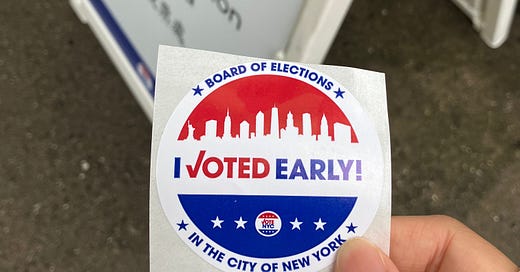Sometimes, I tell people that professionally, I'm out of the politics game. For five years, I was a breaking news and national politics reporter. I've been pretty frank about how I burned out of that quite spectacularly, plunging into a crisis of confidence, to the point that I even questioned whether I should be in this profession at all, unable to recognize that I was in fact very good at my job.
With more distance from it, I've been able to recognize that the combination of all of my experience and interests has made me a sharper thinker, reporter, and writer. Most of my best work is intersectional and interdisciplinary. As I started to shift away from daily politics reporting, I positioned myself as someone who can write authoritatively on many subjects, making a clear case that my years of writing about politics made me better at writing about culture. In my teaching, too, I remind my students that culture is political, that it isn't made in a vacuum, and that good culture reporting and criticism is not just about what's on the screen, or the page, or the canvas. It's also about contending with ideas. Every film, TV series, etc. — whether we realize it or not, or the creator intends for it or not — is an argument. For me, a lot of what hampers a piece of work is when it doesn't have a clear point of view or something to say about a larger idea.
So it's more accurate to say that I've been out of the electoral politics game. I used to really enjoy following elections, nerding out about them in high school and college, and eventually getting to write about them.
At the start of my career, covering a certain presidential election (you know the one) and the subsequent years jaded me. But disillusionment often has a much longer tail. Not everything is generational, and generations are not monoliths (I'm not Hannah Horvath, pontificating about my entire generation). However, it's not lost on me that I came of age in the post-9/11, endless wars era, and the Great Recession, followed by the whiplash of the Obama years. While I remember being skeptical and cynical, "the audacity of hope" and its accompanying iconography were all around us, and it was hard not to feel some sense of promise. Looking back, the country's cultural mood in those years seems so ludicrous, so deeply and utterly misguided, especially because the backlash is what begat Trump.
It's also not lost on me that several of the most promising and prominent political figures right now are around my age. It's not a coincidence that Zohran Mamdani — who last night pulled off a stunning rebuke of a Democratic establishment that threw the kitchen sink at him — is in his early 30s. One of his key endorsers was Rep. Alexandria Ocasio-Cortez, who pulled off a similar seismic shift in 2018 — and is also in her 30s.
Among the Democratic old guard, there has been so much hand-wringing over: how can the party appeal to young people??!! Where's the liberal Joe Rogan?! etc. Well, maybe if you've held power since before many of us were even born, time to cede leadership to actual young people. Identify and nurture candidates who, for instance, understand the internet and social media, and present themselves authentically, not through a strategy brazenly cooked up by an expensive PR firm or tested by focus groups.
Like all elections, there's no single explanation for why Mamdani pulled this off. He ran a smart and far-reaching grassroots campaign; focused on everyday issues and made them accessible and digestible to voters; built a multiracial and multifaith coalition; put in the work of meeting voters where they were; was strategic about ranked choice voting (secondary winner of last night: Brad Lander); etc.
Something I've thought about a lot recently: so much of Democratic politics over the last decade has been about voting against a candidate and a platform (Trump and his lackeys and acolytes). But what has made Mamdani appealing is not just the rebuke to disgraced former Gov. Andrew Cuomo, but giving people someone and something to vote for — voting out of genuine inspiration, not just fear.
Even just anecdotally, people here seemed genuinely excited to get to vote for Mamdani (and Lander to some degree, too), in a way I haven’t seen for a candidate in a long time. Certainly, there are parts of Mamdani's success that aren't applicable to places outside of New York City. But there's no secret sauce here. Be authentic and demonstrate that you understand what voters really care about. Having a lived experience and background that voters can relate to really helps. No need to throw a lot of money and strategists at it to figure that out. (Will the old guard learn the right lessons from this? I'm not holding my breath.)
Mamdani and other younger leaders also seem to grasp people's disillusionment toward electoral politics, likely because they’ve lived through it themselves. It's about the painstaking work between election cycles, and about acknowledging that elections are one lever of the machinery of power, in combination with other levers, like building community or cultural power.
At a rally over the weekend and again during a speech at Mamdani's victory party last night, New York Attorney General Tish James brought up the similarities between Mamdani and Obama. Both times, I winced. A new generation doesn’t always need to be compared to previous generations.
Moreover, what's happening now is not the unbridled optimism of the early Obama years. I imagine a lot of us still feel burned by that era. But like many people here in New York and around the country today, I am allowing myself to feel some shred of hope — a version of it that’s more weathered, more world-weary.
Thanks for reading and for being here. Back on Sunday with a regular edition.




